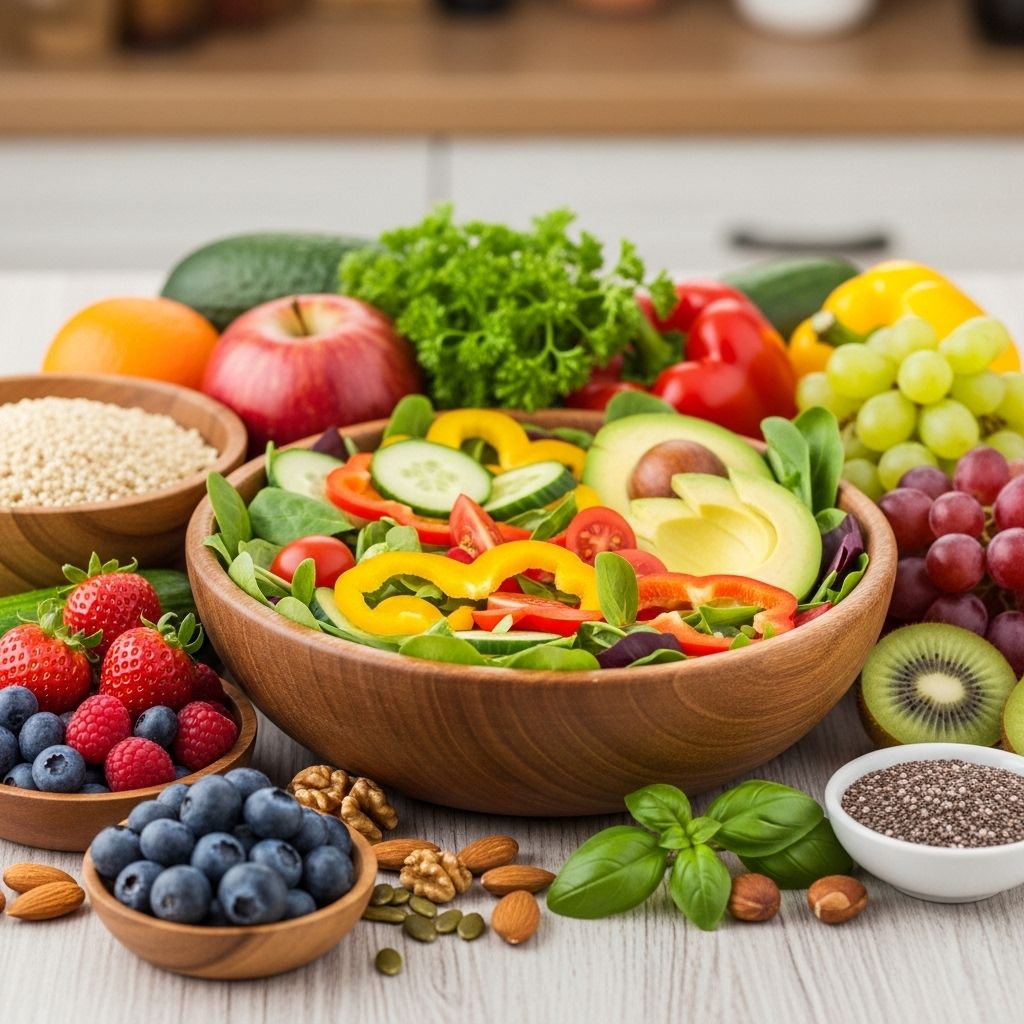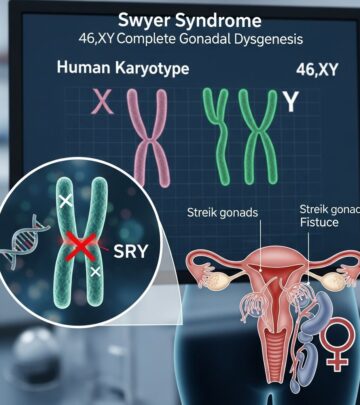Vegetarian Diet: Health Benefits, Types, and Nutritional Guidance
Explore different types of vegetarian diets, their health benefits, and tips for meeting all essential nutrient needs while eating plant-based.

Vegetarian Diet Overview
A vegetarian diet centers around foods derived from plants—fruits, vegetables, grains, beans, peas, nuts, and seeds—and usually excludes meat, poultry, and seafood. This dietary pattern comes in several forms, each differing in its inclusion or exclusion of animal products. With careful planning, a vegetarian diet can provide nearly all the required nutrients for a healthy life at all stages and may offer various health benefits.
Types of Vegetarian Diets
Not all vegetarian diets are the same. Understanding the distinctions can help individuals select the pattern that works best for their lifestyle and nutritional needs.
- Vegan: Excludes all foods of animal origin, including meat, poultry, seafood, eggs, dairy products, and often honey.
- Lacto Vegetarian: Focuses on plant foods and includes dairy products such as milk, yogurt, and cheese, but not eggs or any type of meat or fish.
- Lacto-Ovo Vegetarian: Includes plant foods, dairy products, and eggs, while excluding all meats and seafood.
- Semi-Vegetarian (Flexitarian): Primarily plant-based, this diet occasionally allows poultry, fish, or both, and usually includes eggs and dairy while excluding most or all red meats.
- Pescatarian: A diet that includes plant foods and seafood, but excludes other types of animal flesh. Dairy and eggs may be included.
| Type | Includes | Excludes |
|---|---|---|
| Vegan | All plant-based foods | Meat, poultry, seafood, eggs, dairy, honey |
| Lacto Vegetarian | Plant foods, dairy | Meat, poultry, seafood, eggs |
| Lacto-Ovo Vegetarian | Plant foods, dairy, eggs | Meat, poultry, seafood |
| Semi-Vegetarian | Plant foods, dairy, eggs (occasional poultry/fish) | Red meat (mostly) |
| Pescatarian | Plant foods, seafood, dairy, eggs | Other animal meats (beef, pork, poultry) |
Health Benefits of a Vegetarian Diet
Many scientific studies have associated vegetarian diets with numerous health advantages. A well-planned vegetarian diet can help you:
- Lower risk for obesity: Vegetarians often consume fewer calories overall and a higher proportion of dietary fiber, promoting a healthy weight.
- Reduce risk of heart disease: Diets centered on whole grains, nuts, legumes, and vegetables are linked with lower blood cholesterol and reduced incidence of heart disease.
- Lower blood pressure: Plant-based diets tend to have a positive impact on blood pressure due to higher potassium, magnesium, and lower sodium intake.
- Reduce risk of type 2 diabetes: Studies suggest vegetarians have a reduced likelihood of developing type 2 diabetes, partly due to healthier body weights and better glucose control.
- Increased nutrient intake: Vegetarian diets are often high in dietary fiber, antioxidants, phytochemicals, vitamins (like C and E), and minerals like potassium.
In general, vegetarians tend to have lower intake of saturated fat and cholesterol, and higher intake of vital nutrients.
Nutritional Considerations for Vegetarians
Most nutrients are easily obtainable through a vegetarian eating pattern, especially with varied food choices. However, vegetarians—especially vegans—should pay close attention to several key nutrients to ensure their needs are met. The following sections discuss these nutrients, their importance, and how vegetarians can obtain them.
Protein
Protein is essential for tissue repair, immunity, and maintaining muscle mass. While meat is a classic protein source, plant-based diets can provide ample protein if a variety of items are eaten.
- Common vegetarian protein sources include: beans, lentils, chickpeas, tofu, tempeh, seitan, edamame, quinoa, nuts, seeds, yogurt, eggs, and cheese (if allowed).
- Combining different plant proteins throughout the day helps provide all essential amino acids.
Iron
Iron supports red blood cell production and energy. Plant-based (non-heme) iron is found in:
- Legumes (beans, lentils, peas)
- Tofu and soy-based foods
- Spinach, kale, and other dark leafy greens
- Whole grains
- Nuts and seeds
Tip: Pair iron-rich foods with vitamin C sources (like oranges, peppers, or strawberries) to aid absorption.
Calcium
Calcium is vital for bones, teeth, and nerve function. Lacto and lacto-ovo vegetarians get calcium from dairy; vegans can turn to:
- Fortified plant-based milks (soy, almond, oat, rice)
- Tofu (with calcium sulfate)
- Dark leafy greens (bok choy, collard greens, kale)
- Fortified juices
Zinc
Zinc supports the immune system and cellular functions. Sources for vegetarians include:
- Legumes
- Whole grains (quinoa, oats, brown rice)
- Nuts and seeds
- Cheese and eggs (if included in diet)
Vitamin B12
Vitamin B12 is crucial for nerve health and making red blood cells. It is mostly found in animal products, so vegetarians should note:
- Eggs and dairy (lacto-ovo and lacto vegetarians)
- Fortified foods (cereals, nutritional yeast, some plant milks, and meat analogs)
- Supplements may be necessary for vegans and very restrictive diets
Other Nutrients to Monitor
- Omega-3 fatty acids: Flax, chia seeds, walnuts, and algae-based supplements provide plant sources of these essential fats.
- Vitamin D: Fortified plant milks, mushrooms exposed to sunlight, or supplements can supply this nutrient.
- Iodine: Use iodized salt or sea vegetables like kelp within dietary limits.
Building a Balanced Vegetarian Diet
Meeting nutritional needs on a vegetarian diet is easier with a varied, conscious approach to food selection. Here are essential strategies:
- Eat a variety of foods daily: Mix fruits, vegetables, whole grains, legumes, nuts, seeds, and, if included, eggs and dairy.
- Choose fortified foods for nutrients such as B12, calcium, and vitamin D.
- Limit high-sugar, high-salt, and highly processed foods.
- Read Nutrition Facts Labels for content and ingredients, especially for packaged foods.
- Include a protein source with each meal to support satiety and muscle maintenance.
- Supplement with vitamins or minerals if advised, especially if following a restrictive plant-based diet.
- Consult with a registered dietitian for individual guidance, particularly for children, pregnant or breastfeeding women, older adults, or those with chronic illnesses.
Vegetarian Diets for Different Life Stages
While a vegetarian diet can suit any age or life stage, certain groups must be more mindful of their nutrition:
- Infants, children, and teens: Require adequate energy, protein, calcium, iron, and healthy fats for growth and development.
- Pregnant and breastfeeding women: Have higher needs for protein, iron, calcium, vitamin B12, and omega-3s—fortified foods or supplements may be needed.
- Older adults: Should monitor intake of vitamin B12, calcium, and vitamin D as absorption can decrease with age.
- Individuals with chronic illness: Should consult healthcare providers before making large dietary changes.
Tips for New Vegetarians
- Start by making small changes—add one or two vegetarian meals per week before going fully vegetarian.
- Explore cuisines naturally rich in vegetarian meals, such as Indian or Mediterranean foods.
- Prepare meals at home so you have control over ingredients and enjoy variety.
- Plan meals to ensure nutrient needs are met and to avoid over-reliance on processed foods.
- Connect with vegetarian communities or support groups for recipe ideas and support.
Frequently Asked Questions (FAQ)
Is a vegetarian diet healthy for everyone?
Yes, with proper planning, a vegetarian diet can be healthy and nutritionally adequate for children, adults, older people, and pregnant or breastfeeding women.
Will I get enough protein without eating meat?
Yes, by including a variety of beans, lentils, soy products, grains, nuts, and seeds in your meals, you’ll likely meet your protein needs.
Do I need to take supplements as a vegetarian?
Some vegetarians, especially vegans, may need supplements for vitamin B12, vitamin D, or omega-3s if these nutrients are not being met through diet.
Is a vegetarian diet suitable for athletes?
Absolutely. Many athletes thrive on vegetarian diets, as plant-based foods provide energy, protein, and recovery-supporting nutrients when properly planned.
Can I eat out at restaurants as a vegetarian?
Yes. Many restaurants offer vegetarian or vegan options. Look for menu items featuring beans, grains, vegetables, and request substitutions when needed.
Sample Vegetarian Meal Plan
| Meal | Sample Foods | Main Nutrients Highlighted |
|---|---|---|
| Breakfast | Oatmeal with walnuts and berries, fortified soy milk | Fiber, protein, omega-3s, calcium, B12 (if fortified) |
| Lunch | Chickpea salad sandwich, carrot sticks, apple | Protein, fiber, iron, vitamin C |
| Snack | Greek yogurt (or non-dairy alternative), sunflower seeds | Protein, calcium, zinc |
| Dinner | Stir-fried tofu with broccoli, bell pepper, and brown rice | Protein, iron, vitamin C, fiber |
Resources for Further Reading
- Food Sources of 5 Important Nutrients for Vegetarians – Academy of Nutrition and Dietetics
- Vegetarian Diet: How to Get the Best Nutrition – Mayo Foundation for Medical Education and Research
- Building a Healthy Vegetarian Diet: Myths and Facts – Academy of Nutrition and Dietetics
- Vegetarian Nutrition – National Agricultural Library, USDA
Alternative Names
Lacto-ovo vegetarian, semi-vegetarian, partial vegetarian, vegan, lacto-vegetarian
Read full bio of Sneha Tete












